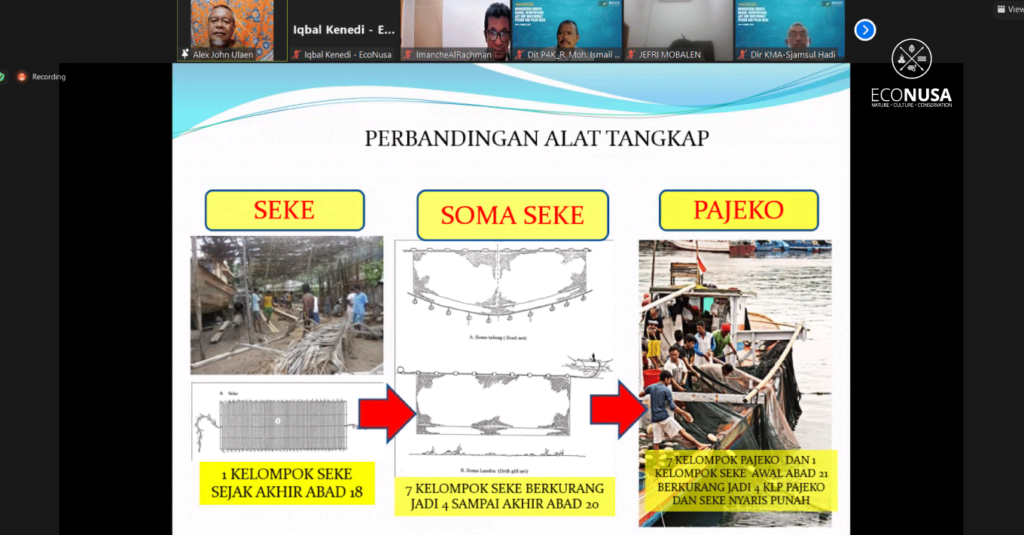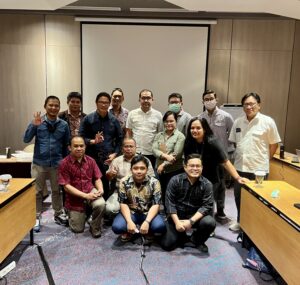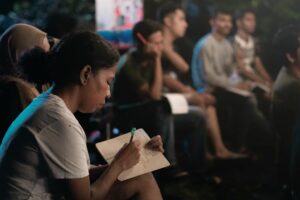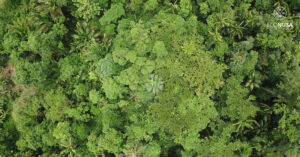
Indigenous peoples have strong ties with their environment. Through local wisdom, they try to protect and sustain the potential resources in their area. Considering the fact, the government makes serious efforts by guiding the indigenous people in Indonesia.
“We had facilitated about the identified 32 (indigenous communities to be appointed,” said Indigenous PeopleCoordinator, Directorate of Coastal and Small Islands Utilization of the Ministry of Maritime Affairs and Fisheries (KKP), Moh. Ismail, in a webinar held by Jaring Nusa on April 11, 2022.
According to Ismail, throughout 2021 there were 22 indigenous communities that have been registered. Furthermore, there are 18 regulations from the regent/mayor in five provinces to manage the indigenous people.
In the context of strengthening indigenous people, KKP has been building the capacity of four communities. Besides, the Indonesian Government through the KKP also provided 45 aid packages to 21 communities in 15 regencies/mayoralties.
Director of Belief in God, Ministry of Education, Culture, Research, and Technology, Sjamsul Hadi, explained about local wisdom from the ancestors of Indonesian people who are dubbed sea gypsies.
“They don’t consume all the fish in their area. They catch sufficiently, and choose fish which are worthy to capture,” said Samsul. According to him, sea gypsies have traditional tools such as arrows and a spearfishing technique traditionally called serampang.
Community empowerment is also conducted by the Ministry of Education, Culture, Research and Technology through the Local Wisdom School program. This program tries to bridge between elderly indigenous people and their youth. The program is expected to create sustainable knowledge transfer in favor of their local interest.
At the same time, the Head of Malaumkarta Village in Sorong Regency, Jefri Mobalaen, told a story about the implementation of local regulations called egek to preserve the environment nearby their place. Egek is Moi Tribes hereditary traditions in Malaumkarta.
“Egek is a local conservation or traditional conservation tool that is implemented by communities,” said Jefri. The purpose of Egek is to protect some areas (sea and forest) from disturbances.
Some of marine commodities targeted by Egek in Malaumkarta are lobster, sea cucumber, and snails. Concerning fishing methods, there is a ban on using destructive tools such as potassium. When egek is open, traditional fishing tools are allowed.
Furthermore, Jefri explained the process of egek establishment. In the beginning, there were discussions prior to making a mutual agreement for egek establishment. After that, leaflets are spread to people and the government to inform the ongoing egek.
Considering the importance of egek in protecting the environment, Jefri has plans to hold an egek cultural festival. Hopefully, egek could be known by a wider community and could be implemented according to their own potential.
Similar things also said by Jala Ina Foundation representatives, Ode Zulkarnain Sahji, that explained about coastal customary laws. One of the laws here is so-called ngam katula or mackerel fish catch management that is conducted by Namalomin communities in Seram Timur Regency, Maluku Province.
“During high tide and wind seasons, mackerel fish will swim to the Namalomin Village area,” said Zulkarnain. After that, to avoid overexploitation, ngam katula will be open for just a few hours.
The catchment of mackerel was conducted using traditional fishing nets. Interestingly, the fishermen will not catch the mackerel that goes beyond the village territory because it is considered no longer their rights. The collected catches are done collectively and then distributed to the peoples surrounding the villages.
The use of traditional catchment tools in fishing activities has already become the marine tradition of coastal communities. One of the traditions that are taken their forms into local wisdom is seke-maneke in Sangihe Islands Regency, North Sulawesi Province.
“The activity of seke or maneke using traditional catchment tools and therefore really shows the nautical traditions,” said historian and nautical tradition observer, Alex John Ulaen.
According to John, seke is the traditional fishing gear set consisting of two types outrigger canoe, also pamo type boat and a fishing tool called pandihe (bamboo chain for catching fish). Maneke is the fishing activity using those tools in a collective and organized manner. The term for the person acting the maneke is called mananeke.
The transition from nautical to maritime culture is marked by the presence of pump boats. Unfortunately, according to John, this is slowly removing maritime tradition such as the habit of singing sasambo by fishermen, and local wisdom such as fishermen knowledge on time prediction to avoid current when sailing.
John said that such traditions need to be preserved. In addition to the existing local wisdom, the tradition is proven to protect nature. “If the maritime traditions are already gone, then what is left?” said John.
Editor: Editor: Nur Alfiyah, Lutfy Putra, Leo Wahyudi




